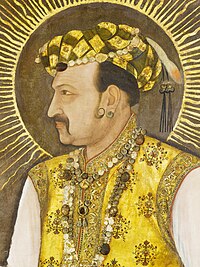Jahangir
This article does not have any sources. (November 2012) |

Mirza Nur-ud-Din Muhammad Salim Baig (known by his imperial name Jahangir) (31 August 1569 – 28 October 1627) was the fourth Mughal Emperor from 1605 to 1627.
Jahangir was the eldest son of Mughal Emperor Akbar the Great. He was married to Queen Nur Jahan ('Light of the World') and was much under her influence. she handled court matters and coins were issued in her name. He is especially well-known because of his memoirs, the Naam-i-Jahangiri (also called the Jahangir-name by some). His eldest son was Shah Jahan. Prince Khurram rebelled in the last years of his reign. The efforts of Nur Jahan, Jahangir's wife, to marginalize him were unsuccessful. In 1622, Jahangir sent his son Prince Khurram against the combined forces of Ahmednagar, Bijapur and Golconda. After his son Khurram turned against his father and made a bid for power. As with the insurrection of his eldest son Khusrau Mirza, Jahangir was able to defeat the challenge from within his family and retain power. He conquered many new territories both in the north and in the south especially through his most decorated general, Muhammad Beg Zulfiqar Khan. He died at Mirpur on his way back from Kashmir to Lahore. After his death, Nur Jahan isolated herself and never talked to anyone.
He was buried at Lahore city, now in Pakistan. After his death, by his son and successor Shah Jahan came to power. Shah Jahan killed his father for his desire to be the ruler of the world but couldn't succeed, still military campaigns started by Akbar continued.
He also consumed excessive amounts of opium, at one point employing a special servant just to manage his supply of intoxicating drugs.

